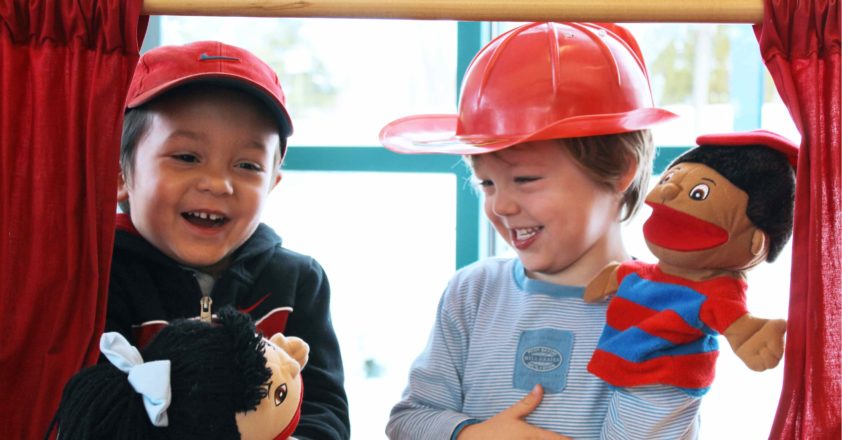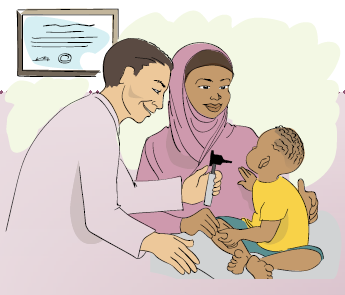Maryland Libraries: Rocking the Right Book for the Right Child – and More!
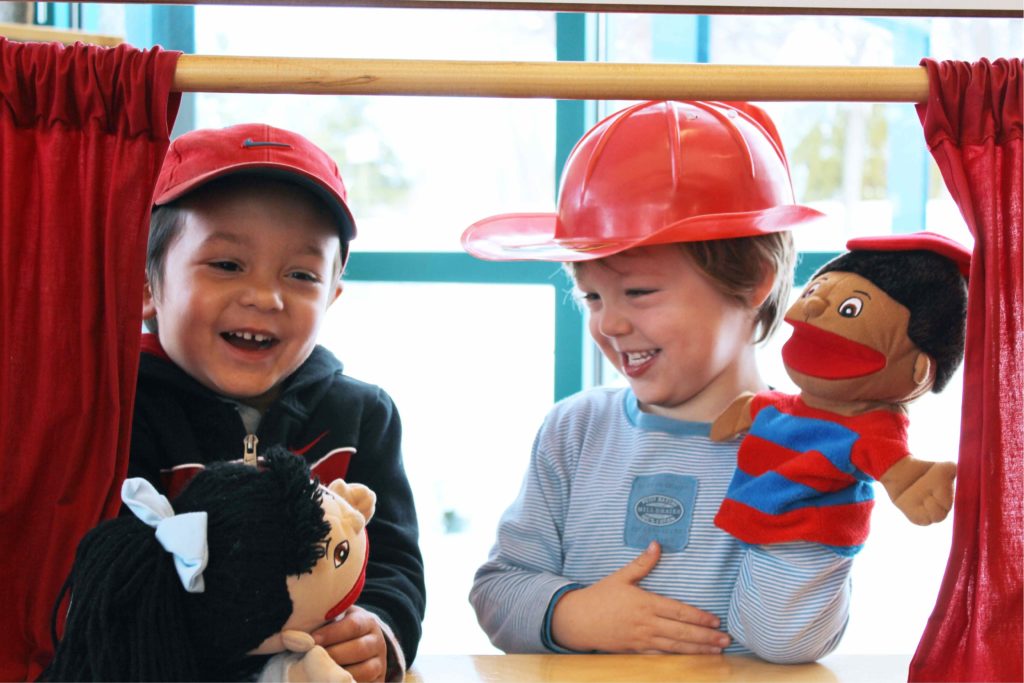
Boys delight the crowd with a puppet show at a Carroll County Public Library.
In Eric Litwin’s Pete the Cat book, “Pete is sitting at his desk when his teacher says, ‘Come on, Pete down that hall to a room with books on every wall.’ Where is Pete going? The Library!”
Does it matter whether Pete the Cat selects a book from a physical or virtual wall at the library? Goodness no! The messages, art, ideas and meaning in a book or media experience matter more than the format. Thinking beyond what is on the page or screen can strengthen a young child’s—indeed anyone’s—imagination.
Books – in print or the e-book versions – can open doorways to discovery. Perfect Piggies! by Sandra Boynton, for example, delights babies and toddlers with quirky fun, and upbeat illustrations and helps grown-ups interact and bond with children.
“Isn’t that pig silly? What do you think will happen next?” Adults learn to relax and enjoy the “conversation”— “bah doo bah doink.”
Families can invite story connections to personal life. “A piggy needs kindness. Wasn’t Grandma kind to bring us flowers yesterday?”
A well-chosen book and a suggested home activity can help families create heart-to-heart intimacy with their children. Library play-and-learn centers magnetically draw children into play that engages and inspires them. Grown-ups and children—by talking, singing, reading, writing and playing—can enter this world of discovery.
In helping young children prepare for school, the Maryland State Department of Education asked: What better place for families to find exciting—free— resources for early learning and play activities than at the public library? Indeed, where else could they ask the question? Bah doo bah doink!
Although the core purpose of a library remains the same–to enlighten humanity–technology and easy access to information has shifted how libraries can fulfill their purpose. Today’s libraries are more than books!
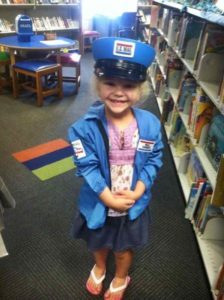
The youngest member of the U.S. Postal Service at Cecil County Public Library.
Librarians challenge themselves and each of us to “welcome all,” embracing the human impulse to grow and celebrate life. Families who may be strangers to the library or each other can find assistance, encouragement and inspiration in a library. Librarians help children discover they can respect each other and get along. Many of us discover the right book at the right time to solve a problem or gain understanding. However, the benefits of a library may not impact us overnight but rather soak in gradually as we enjoy lifelong learning and broaden our horizons.
The importance of childhood play–as a key component to learning–can be traced back to Plato, who talked about “good play.” What is good play? Plato recognized good play as that which leads to the good. He contrasted it to “bad play,” which deflects the learner from this goal. We may think about physical play when discussing children’s play.
However, play involves more than the physical interaction of engaging with others or things. Mental play stimulates the imagination and helps teach children to pursue the good in themselves and the good in life. Picture books help children grapple with important life experiences and unexpected challenges. After all, what do children learn when bully other children? Bullying behavior reinforces a selfish outlook on life. Good play should take children beyond personal needs. The good play that Plato refers to teaches children to interact for the good of all.
Children who learn to play in an ideal spirit and develop a habit of playing together to pursue the “good” are more likely to grow up with playful and inquisitive minds. Play is “a jumping-off place” that can set the possibility of learning in motion.
Through their spaces, resources, collections and programs, Maryland public libraries help develop playful, inquisitive minds and guide children and their caregivers in good play.
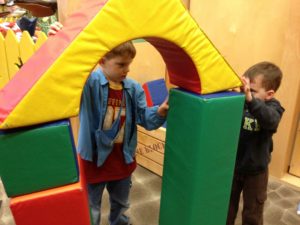
Building a tower in the Construction Zone of Baltimore County Public Library’s Storyville at Rosedale.
Spaces such as the Storyville at the Baltimore County Public Library provide intentionally created spaces for engaging play and are designed to promote early literacy and school readiness skills. Storyville is a child-sized village with developmentally appropriate books, toys and activities for children birth to age 5 and their families.
In addition to these spaces that encourage interactive play, children’s departments in public libraries throughout Maryland provide similar play and learning centers where children can explore and inquire. They can engage with books, learning toys and learning spaces such as trains, pirate ships and grocery stores, all fostering imagination and creativity. Teen Zones contain collaborative, welcoming spaces for teens seeking a safe space for their academic, creative, and social and emotional needs.
Maryland public libraries provide various resources and collections for children and families. “Literacy Kits,” “Adventure Totes,” and “Make and Learn Bags” with resources such as books, learning toys and music CDs are available for families, teachers and providers to borrow for a home or educational setting.
These resources are designed to explore a variety of topics and skills. Parenting collections, bilingual books, games, puzzles, audiobooks, STEM (science, technology, engineering, math) materials, gaming and video equipment, DIY (do-it-yourself) offerings, and of course, books enable children, their caregivers and teens to gain new knowledge that suits their learning style and meet their ever-changing needs and interests.
There is no end to the variety of programs offered by Maryland public libraries to meet the interests of children and teens of all ages, including:
- Pajama Parties
- Coding with Cubetto
- Lego Clubs
- Sensory Storytimes for families with children with special needs
- Science Clubs
- Family Storytimes
- Homework Help
- 3D printing
- Book Clubs
- Pokémon Club
- Baby Rembrandt
- Paws to Read (reading with dogs)
- Virtual Reality
- Teen Gaming Groups
- Minecraft
- Escape Rooms
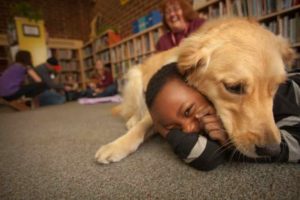
At Enoch Pratt Free Library, a boy cuddles with his reading partner.
Library programs also exist beyond the walls of our library branches in locations such as the Judy Centers, Head Start programs, WIC locations, correctional facilities, health care clinics, farmers’ markets, schools, Boys and Girls Clubs and early child care programs. Maryland public libraries strive to provide the spaces, resources, collections, programs and expertise that serve as foundations for learning and growing, as well as leaping-off points for imagination, creativity and critical thinking.
Whether it is Pete the Cat, a Sandra Boynton Piggie, a pirate ship to steer, a Minecraft mob to conquer, a dog to read to, or a robot to lead through a maze, Maryland public libraries help our children avoid Plato’s bad play by achieving their goals of growing, learning and exploring. Through these learning resources and opportunities, Maryland public libraries hope that Plato would be pleased with all the good play happening in our libraries today.

